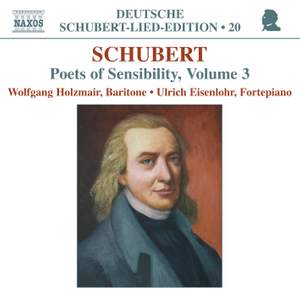Volume 20 - Poets of Sensibility Volume 3
Wolfgang Holzmair (baritone), Ulrich Eisenlohr (fortepiano)
The pre-Romantic poets of Empfindsamkeit ('sensibility'), represented here by Hölty, Claudius and Stolberg, inspired a handful of famous Schubert settings alongside dozens of songs that are still... — More…
CD
$13.25Downloads
What are FLAC and MP3?Contents
Schubert: Der Tod und das Mädchen, D531
- Ulrich Eisenlohr (piano), Wolfgang Holzmair (baritone)
Der Tod und das Madchen, D. 531
Schubert: Der Leidende, D. 432b
- Ulrich Eisenlohr (piano), Wolfgang Holzmair (baritone)
Der Leidende (3rd setting), D. 432c
Schubert: Totengraberlied, D. 44 (2nd setting)
- Ulrich Eisenlohr (piano), Wolfgang Holzmair (baritone)
Totengraberlied, D. 44
Schubert: Die Mutter Erde, D788 (Stolberg)
- Ulrich Eisenlohr (piano), Wolfgang Holzmair (baritone)
Lied, "Die Mutter Erde" (Des Lebens Tag...), D. 788
Schubert: Der Leidende, D. 432a
- Ulrich Eisenlohr (piano), Wolfgang Holzmair (baritone)
Der Leidende (2nd setting), D. 432b
Schubert: Die Nonne, D208 (Holty)
- Ulrich Eisenlohr (piano), Wolfgang Holzmair (baritone)
Schubert: Taglich zu singen, D533 (Claudius)
- Ulrich Eisenlohr (piano), Wolfgang Holzmair (baritone)
Schubert: Klage (Trauer umfliesst mein Leben), D. 371
- Ulrich Eisenlohr (piano), Wolfgang Holzmair (baritone)
Schubert: Stimme der Liebe D412 (Stolberg)
- Ulrich Eisenlohr (piano), Wolfgang Holzmair (baritone)
Schubert: Seufzer D198 (Holty)
- Ulrich Eisenlohr (piano), Wolfgang Holzmair (baritone)





